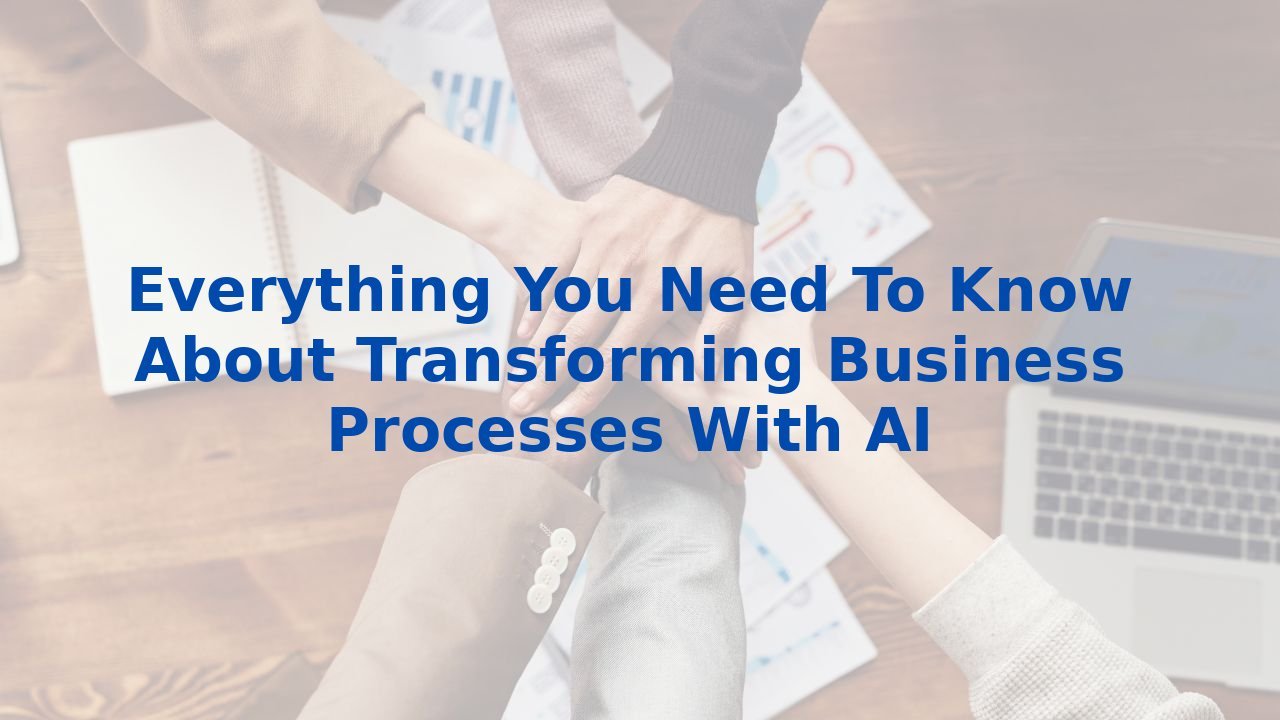Everything You Need To Know About Transforming Business Processes With AI
Everything You Need To Know About Transforming Business Processes With AI
In today’s ever-accelerating business landscape, companies must constantly adapt to enhance operational efficiency and maintain a competitive edge. One significant advancement that holds transformative power is the integration of Artificial Intelligence (AI) into business process management (BPM). This article will explore how AI can fundamentally enhance various business processes, the myriad benefits it provides, and the critical role of employee training in leveraging these advancements effectively.
Enhancing Business Processes with AI
AI breathes new life into business processes in several profound ways:
1. Process Discovery and Mapping
The journey begins with AI’s capability to discover existing processes through advanced technologies, such as process mining and natural language processing. This crucial step illuminates inefficiencies and bottlenecks that might elude traditional human analysis. Not only does AI unveil these hidden aspects, but it also continuously maps out processes in real-time, ensuring that documentation stays current. This proactive approach equips organizations to address potential issues swiftly, fortifying operational integrity.
2. Process Automation
AI's prowess in automation is a game-changer. Routine tasks—think data entry or meeting scheduling—are automated with precision, significantly reducing human error and allowing teams to dedicate time to more strategic endeavors. Furthermore, AI bots can handle previously manual activities independently, enhancing speed and driving down costs, ensuring a level of consistency and accuracy unattainable through manual processes.
3. Process Management and Improvement
In a world that demands agility, real-time process monitoring becomes indispensable. AI facilitates this by providing timely insights about current process statuses, permitting immediate intervention when necessary. Coupled with predictive analytics, AI analyzes historical data to forecast future trends and unveil potential challenges before they escalate, ensuring that organizations stay a step ahead.
4. Decision-Making and Compliance
The data-driven insights generated by AI empower organizations to make decisions with confidence. By analyzing vast troves of information, AI lays bare opportunities for improvement that might otherwise be overlooked. Moreover, automated processes executed consistently and in line with industry standards significantly reduce compliance risks, enabling businesses to navigate regulatory landscapes with ease.
5. Enhanced Customer Satisfaction
AI is also a cornerstone for fostering elevated customer experiences. Through personalized support, faster response times, and improved overall accuracy, AI enables businesses to engage customers meaningfully. By automating customer service functions, organizations can build stronger bonds with their clientele, creating loyalty and trust.
The Benefits of AI for Improving Efficiency
Integrating AI into business processes yields a bounty of benefits:
- Increased Productivity: With routine tasks automated, employees can devote their expertise to high-value activities, drastically amplifying productivity.
- Cost Reduction: AI minimizes reliance on manual labor while optimizing resource allocation, consequently slashing operational costs.
- Better Decision-Making: Leveraging AI for predictive modeling and analytics empowers businesses to make informed, data-backed decisions that drive sustainable growth.
- Improved Compliance: Consistency in processes mitigates the risk of non-compliance, insulating organizations from penalties and fines.
The Importance of Employee Training for AI
While AI stands as a formidable asset in refining business processes, its true potential is unlocked only through adequate employee training. Here’s why it’s vital:
Understanding AI Capabilities:
Employees must grasp the functionalities and limitations of AI to incorporate it seamlessly into their workflows. Ensuring they can interpret AI-driven insights accurately promotes more efficient processes.
Adapting to New Technologies:
As AI technologies evolve, the ability for employees to adapt and learn new tools becomes paramount. Organizations that cultivate a culture of ongoing learning will thrive in the dynamic realm of business.
Enhancing Decision-Making Skills:
Training in data analysis and decision-making enables employees to harness AI insights effectively. When staff members feel confident in their understanding of AI tools, they can make informed, accurate decisions that resonate within the organization.
Conclusion
In conclusion, embedding AI into business process management is not just a trend; it’s a revolutionary step towards achieving operational efficiency and sustained competitiveness. By harnessing AI for process discovery, automation, real-time monitoring, and enhanced decision-making, organizations can harvest a multitude of benefits. However, to fully realize this potential, a commitment to employee training is essential. Investing in your workforce ensures that they are well-prepared to leverage AI’s power, positioning your organization for growth and success in the long run.
For those eager to explore AI training and certification options, consider visiting Complete AI Training. Empower your workforce with the skills needed to thrive in an AI-driven landscape.



